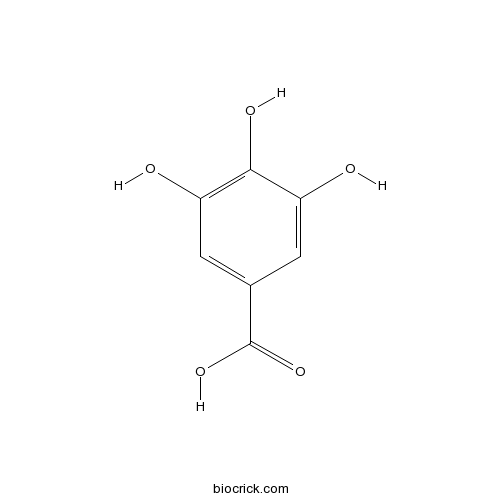Rhodiola sacra
Rhodiola sacra
1. The products in our compound library are selected from thousands of unique natural products; 2. It has the characteristics of diverse structure, diverse sources and wide coverage of activities; 3. Provide information on the activity of products from major journals, patents and research reports around the world, providing theoretical direction and research basis for further research and screening; 4. Free combination according to the type, source, target and disease of natural product; 5. The compound powder is placed in a covered tube and then discharged into a 10 x 10 cryostat; 6. Transport in ice pack or dry ice pack. Please store it at -20 °C as soon as possible after receiving the product, and use it as soon as possible after opening.
Natural products/compounds from Rhodiola sacra
- Cat.No. Product Name CAS Number COA
-
BCN1668
Gallic acid149-91-7
Instructions

Rhodiola sacra aqueous extract (RSAE) improves biochemical and sperm characteristics in cryopreserved boar semen.[Pubmed: 19108879]
Although Rhodiola sacra aqueous extract (RSAE) has been used in many studies as an antioxidant, its effects on semen characteristics and its antioxidant properties during cryopreservation of boar sperm have never been evaluated. Semen was collected from five Duroc boars (2-4-year-old) twice weekly and frozen-thawed in extender with RSEA. Motion characteristics were assessed with a computer-aided semen analysis (CASA) system, whereas other sperm quality end points were assessed by routine methods. The effective concentration of RSEA in extender ranged from 4 to 8mg/L and the effect of RSEA on sperm quality was better in glycerol-free extender than extender containing glycerol (P<0.05). In frozen-thawed boar semen, there was a direct correlation (P<0.05) between RSEA concentration and glutathione (GSH) concentrations, mitochondrial activity, and hypoosmotic swelling test (HOST), and an inverse correlation (r=-0.982, P<0.05) between RSEA concentration and malondialdehyde (all end points were significantly higher at 6mg/L than in the control group). In summary: (i) the effective concentration of RSEA in extender ranged from 4 to 8mg/L; (ii) the effect of RSEA on sperm quality was better in extender without glycerol; and (iii) there was a significant correlation between RSEA concentrations and concentrations of GSH and MAD in frozen-thawed boar semen (antioxidant effects of RSEA were concentration-dependent). Further studies are needed to define the active ingredient in RSEA that protects boar sperm against ROS.
Autonomic nervous system mediates the cardiovascular effects of Rhodiola sacra radix in rats.[Pubmed: 18692558]
Rhodiola sacra (Crassulaceae) exhibits cardiovascular bioactivities and is used in Tibetan medicine for promoting circulation and preventing hypertension. However, the underlying mechanisms of its cardiovascular effects are poorly understood.
Neuroprotective effects of constituents of the oriental crude drugs, Rhodiola sacra, R. sachalinensis and Tokaku-joki-to, against beta-amyloid toxicity, oxidative stress and apoptosis.[Pubmed: 12186418]
We tested the constituents of two Rhodiola plants, Rhodiola sacra S. H. Fu and R. sachalinensis A. BOR, and an Oriental crude drug, Tokaku-joki-to, for their neuroprotective effects. Of the 58 compounds tested, six had considerable protective effects against beta-amyloid-induced death of B103 neuronal cells in vitro. These six compounds also showed protective effects against staurosporine-induced cell death, and two of the six compounds protected neurons from H2O2-induced cell death. These results suggest that some of the tested compounds protect neurons from beta-amyloid toxicity based on antiapoptotic and antioxidative activity.
Active-oxygen scavenging activity of traditional nourishing-tonic herbal medicines and active constituents of Rhodiola sacra.[Pubmed: 10616967]
The active-oxygen scavenging activity of 70 traditional herbal medicines used in China and Japan as nourishing tonics were evaluated by electron spin resonance (ESR) technique, in order to evaluate their effectiveness for anti-aging and to search for new active-oxygen scavengers from natural resources. Most of the 70 herbal medicines showed scavenging activity with various intensities. Areca catechu (methanol extract), Dendrobium plicatile (methanol extract), Juglans regia (water extract), Paeonia lactiflora (methanol extract), Psychotria serpens (water and methanol extracts), Rhodiola sacra (water and methanol extracts) and Uncaria rhynchophylla (water extract) especially showed strong scavenging activity against superoxide anion radical (*O2-), while J. regia (water and methanol extracts), Morus alba (water extract) and Schisandra chinensis (water extract) revealed strong scavenging activity against hydroxyl radical (HO*). In addition, the active-oxygen scavenging activities of 19 compounds isolated from R. sacra were also examined, and hydroquinone (1), caffeic acid (3), protocatechuic acid (6), gallic acid (7), (-)-epigallocatechin 3-O-gallate (8), 3-O-galloylepigallocatechin-(4beta-->8)-epigallocatechin+ ++ 3-O-gallate (10), heterodendrin (17) and gallic acid 4-O-beta-D-glucopyranoside (19) were found to show mild or strong inhibitory activity against superoxide anion radical (*O2-), while 4-hydroxybenzoic acid (2), 3, 4-hydroxycinnamic acid (4), 6-8 and 19 inhibited hydroxyl radical (OH*). These active-oxygen scavengers may contribute, to different extents, to their anti-aging action.
Screening of crude drug extracts for prolyl endopeptidase inhibitory activity.[Pubmed: 10439485]
Prolyl endopeptidase (PEP, EC 3.4.21.26) is an enzyme to play a role in metabolism of proline-containing neuropeptides, such as vasopressin, substance P and thyrotropin-releasing hormone (TRH), which were suggested to be involved with learning and memory processes. Then, specific inhibitor of PEP is expected to have antiamnesic effects, and thus we screened forty-six water- and methanol-extracts from crude drugs selected on the basis of traditional Chinese medicine theory, for Flavobacterium prolyl endopeptidase inhibition. Among them, the water-extracts of Rhodiola sacra (IC50, 0.77 microgram/ml) and the methanol-extracts of Lycopodium clavatum (IC50, 1.3 micrograms/ml), Paeonia lactiflora var. trichocarpa (IC50, 5.7 micrograms/ml), Paeonia veitchii (IC50, 2.4 micrograms/ml) and Rhodiola sacra (IC50, 0.67 microgram/ml) showed strong inhibitory activity. In addition, we also examined the PEP inhibitory activity of eleven compounds from Salvia deserta, and found that in addition to a catechol group alpha-hydroxy-para-quinone group may be related to the PEP inhibition.


